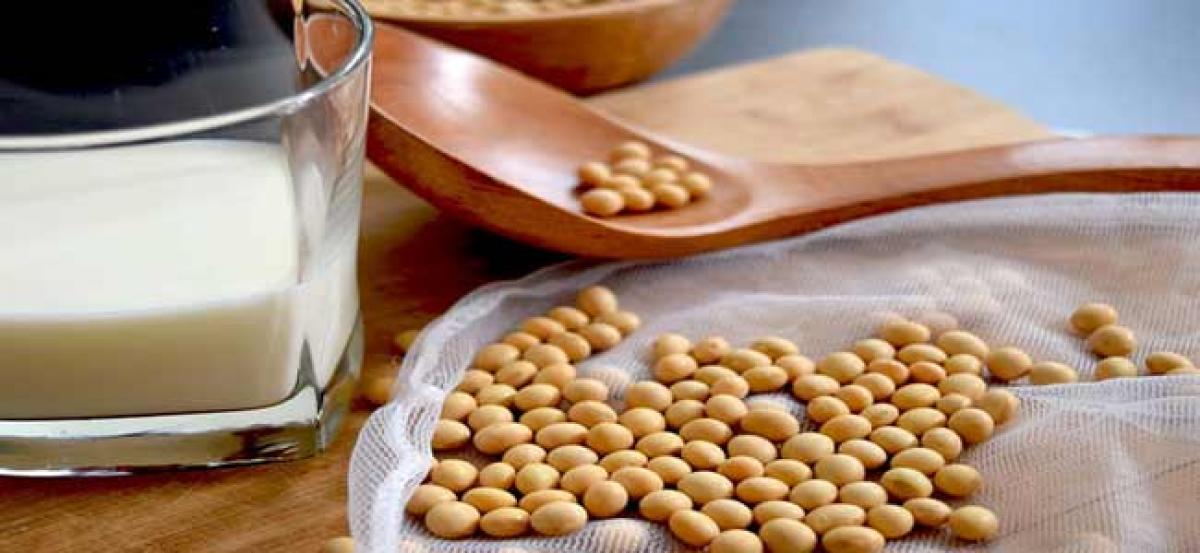Live
- Punjab DGP, MHA official request farmer leader Dallewal to end 20-day fast
- Govt unveils ‘Jalvahak’ to boost inland waterways
- List of criminals: Delhi BJP chief on AAP panel of 38 candidates
- PSBs in India clock record Rs 1.41 lakh crore in net profit in FY24
- Telangana Government Announces Key Development Plans: Bhatti Vikramarka
- Crackdown on illegal poppy farming in Manipur: Assam Rifles destroyed 6,228 acres in 5 years
- South Korea's ruling party leader cancels press conference amid calls for resignation
- AIADMK's big meet discusses 2026 polls, prospective alliances
- BJP questions Congress-Shiv Sena (UBT) alliance over Aaditya Thackeray's Savarkar-Nehru remark
- Maha Oppn to boycott customary CM tea meet, cites rising farmers' distress, atrocities against Dalits
Just In

Here are some food items every breast cancer survivor should know about.
Washington D.C. [USA]: Here are some food items every breast cancer survivor should know about.
Consuming soy milk, tofu, cabbages, and broccoli can be associated with lessening of common side effects of breast cancer treatment.
The research has been conducted by a team of scientists at Georgetown Lombardi Comprehensive Cancer Center.
In the study, higher intake of cruciferous vegetables and soy foods were associated with fewer reports of menopausal symptoms. Higher soy intake was also associated with less reported fatigue.
The breast cancer survivors studied included 173 non-Hispanic white and 192 Chinese Americans including US-born Chinese and Chinese immigrants.
Researchers say breast cancer survivors often experience side effects from cancer treatments that can persist months or years after completion of treatment.
For example, because many treatments designed to prevent breast cancer recurrence inhibit the body's production or use of estrogen, the hormone that can fuel breast cancer growth, breast cancer patients often experience hot flashes and night sweats, among other side effects.
The lead author on the study, Sarah Oppeneer Nomura, PhD, of Georgetown Lombardi, said that while further research is needed in larger study populations and with more detailed dietary data, this project addresses an important gap in research on the possible role of lifestyle factors, such as dietary habits, in relation to side effects of treatments.
"These symptoms can adversely impact survivors' quality of life and can lead them to stopping ongoing treatments," she says.
"Understanding the role of life style factors is important because diet can serve as a modifiable target for possibly reducing symptoms among breast cancer survivors."
When study participants were evaluated separately by race/ethnicity, associations were significant among white breast cancer survivors; however; while a trend was seen in the benefit for Chinese women, results were not statically significant.
Researchers explain Chinese women typically report fewer menopausal symptoms. Most of them also consume cruciferous vegetables and soy foods, making it difficult to see a significant effect in this subgroup. Indeed, in this study, Chinese breast cancer survivors ate more than twice as much soy and cruciferous vegetables.
Whether the reduction in symptoms accounts for longtime use of soy and cruciferous vegetables needs further investigation, says the study's senior author, Judy Huei-yu Wang, PhD, of Georgetown Lombardi's Cancer Prevention and Control Program.
Results obtained in preclinical studies in animals show that biologically active compounds present in both soy and cruciferous vegetables cause breast cancer cells to grow, but have opposite effects in animals that consume these compounds well before cancer is diagnosed and continue consuming them during and after cancer treatments.
Until more research is conducted, breast cancer patients should not suddenly start eating soy, if they have not consumed it before, says Leena Hilakivi-Clarke, PhD and a co-author of the study.
Researchers also found suggestive associations with lower reporting of other symptoms, including joint problems, hair thinning/loss and memory less in women who consumed more soy foods, but these associations did not reach statistical significance.
Phytochemicals, or bioactive food components, such as isoflavones in soy foods and glucosinolates in cruciferous vegetables may be the source of the benefit, researchers say.
Isoflavones bind to estrogen receptors and exert weak estrogenic effects, among other effects. Glucosinolates in cruciferous vegetables influence levels of metabolizing enzymes that can modulate inflammation and levels of estrogen, possibly attenuating treatment-related symptoms.
The findings have been published in Breast Cancer Research and Treatment.

© 2024 Hyderabad Media House Limited/The Hans India. All rights reserved. Powered by hocalwire.com







